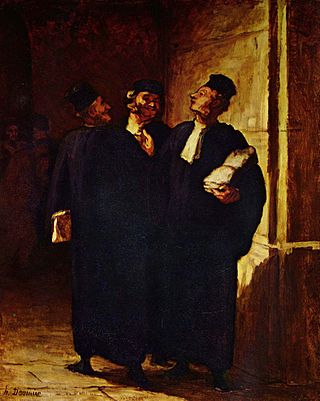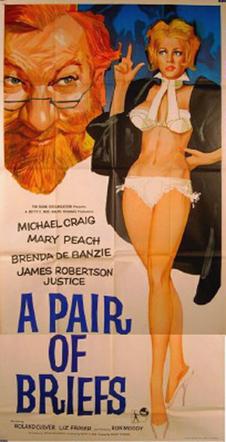Related Research Articles

A barrister is a type of lawyer in common law jurisdictions. Barristers mostly specialise in courtroom advocacy and litigation. Their tasks include taking cases in superior courts and tribunals, drafting legal pleadings, researching the law and giving expert legal opinions.

A lawyer is a person who practices law. The role of a lawyer varies greatly across different legal jurisdictions. A lawyer can be classified as an advocate, government lawyer, attorney, barrister, canon lawyer, civil law notary, counsel, counselor, solicitor, legal executive, or public servant — with each role having different functions and privileges. Working as a lawyer generally involves the practical application of abstract legal theories and knowledge to solve specific problems. Some lawyers also work primarily in advancing the interests of the law and legal profession.

An advocate is a professional in the field of law. Different countries' legal systems use the term with somewhat differing meanings. The broad equivalent in many English law–based jurisdictions could be a barrister or a solicitor. However, in Scottish, Manx, South African, Italian, French, Spanish, Portuguese, Scandinavian, Polish, Israeli, South Asian and South American jurisdictions, "Advocate" indicates a lawyer of superior classification.
A solicitor is a legal practitioner who traditionally deals with most of the legal matters in some jurisdictions. A person must have legally-defined qualifications, which vary from one jurisdiction to another, to be described as a solicitor and enabled to practise there as such. For example, in England and Wales a solicitor is admitted to practise under the provisions of the Solicitors Act 1974. With some exceptions, practising solicitors must possess a practising certificate. There are many more solicitors than barristers in England; they undertake the general aspects of giving legal advice and conducting legal proceedings.
The call to the bar is a legal term of art in most common law jurisdictions where persons must be qualified to be allowed to argue in court on behalf of another party and are then said to have been "called to the bar" or to have received "call to the bar". "The bar" is now used as a collective noun for barristers, but literally referred to the wooden barrier in old courtrooms, which separated the often crowded public area at the rear from the space near the judges reserved for those having business with the court. Barristers would sit or stand immediately behind it, facing the judge, and could use it as a table for their briefs.
A brief is a written legal document used in various legal adversarial systems that is presented to a court arguing why one party to a particular case should prevail.
A pupillage, in England and Wales, Northern Ireland, Kenya, Malaysia, Pakistan and Hong Kong, is the final, vocational stage of training for those wishing to become practising barristers. Pupillage is similar to an apprenticeship, during which bar graduates build on what they have learnt during the Bar Professional Training Course or equivalent by combining it with practical work experience in a set of barristers' chambers or pupillage training organisation.
Devilling is the custom of more senior self employed barristers/advocates making use of their junior’s services to complete briefs belonging to the more senior barrister/advocate, usually without the knowledge of the attorney. Not to be confused with the period of training called pupillage or junior work undertaken by a person wishing to become an advocate in one of the English-speaking common law systems of the United Kingdom, Ireland, Hong Kong, and Australia.
Legal executives are a form of trained legal professional in certain jurisdictions. They often specialise in a particular area of law. The training that a Legal Executive undertakes usually includes both vocational training and academic qualifications.

Barristers in England and Wales are one of the two main categories of lawyers in England and Wales, the other being solicitors. Barristers have traditionally had the role of handling cases for representation in court, both defence and prosecution.
In law, a barrister's chambers or barristers' chambers are the rooms used by a barrister or a group of barristers. The singular refers to the use by a sole practitioner whereas the plural refers to a group of barristers who, while acting as sole practitioners, share costs and expenses for office overheads. The concept of barristers' chambers is commonly thought of as a law firm.

Solicitor advocate is a hybrid status which allows a solicitor in the United Kingdom and Hong Kong to represent clients in higher courts in proceedings that were traditionally reserved for barristers. The status does not exist in most other common law jurisdictions where, for the most part, all solicitors have rights of audience in higher courts.
In common law, a right of audience is generally a right of a lawyer to appear and conduct proceedings in court on behalf of their client. In English law, there is a fundamental distinction between barristers, who have rights of audience in the superior court, and solicitors, who have rights of audience in the lower courts, unless a certificate of advocacy is obtained, which allows a solicitor advocate to represent clients in the superior courts also. There is no such distinction in American law.
A training contract is a compulsory period of practical training in a law firm for law graduates before they can qualify as a solicitor in the United Kingdom (UK), the Republic of Ireland, Australia or Hong Kong, or as an advocate and solicitor in Singapore. During the training period, the participant is known as a trainee solicitor or trainee lawyer.

A Pair of Briefs is a 1962 black and white British courtroom comedy film directed by Ralph Thomas and starring Michael Craig, Mary Peach, Brenda De Banzie and James Robertson Justice. The screenplay concerns a newly qualified female barrister who clashes with a male colleague when they represent opposite sides in a matrimonial dispute.
Brick Court Chambers is a set of barristers' chambers in the Temple district of central London. It specialises in commercial, EU, competition and public law. Brick Court Chambers was founded in 1921 by William Jowitt KC, who later became Lord Chancellor. It rose to prominence in the 1970s, with an increase in shipping and international trade litigation.

The Bar of Ireland is the professional association of barristers for Ireland, with over 2,000 members. It is based in the Law Library, with premises in Dublin and Cork. It is governed by the General Council of the Bar of Ireland, which was established in 1897. The Council is composed of twenty-five members: twenty who are elected, four co-opted, and the Attorney-General, who holds office ex officio. Every year, ten members are elected for two-year terms; five by senior counsel and five by junior counsel.
The Legal profession in England and Wales is divided into two distinct branches under the legal system, those of solicitors and barristers. Other legal professions in England and Wales include acting as a judge, as the Attorney-General, as the Solicitor-General, or as the Director of Public Prosecutions.

Tuckers Solicitors LLC, known as Tuckers Solicitors, is a national criminal defence firm that has particular specialisation in serious crime, extradition, martial and military law, civil liberties, human rights, cyber crime and is one of the largest law firms headquartered in London. The firm featured in series of television shows about crime and disorder on national channels and has appeared on national news, commenting on various legal affairs.

QEB Hollis Whiteman is a leading set of barristers' chambers specialising in criminal, financial, and regulatory law, located in the City of London. Established in the 1980s, it employs 70 barristers, including 21 King's Counsel, four Treasury Counsel and one Standing Counsel to the RCPO. The current Heads of Chambers are Selva Ramasamy KC and Adrian Darbishire KC and the Chief Clerk is Chris Emmings.
References
- ↑ SSRN-'He's Fucking Marvellous!': The Fall and Rise of Barristers' Clerks by John Flood
- 1 2 3 4 5 6 Akam, Simon (May 22, 2017). "The Exquisitely English (and Amazingly Lucrative) World of London Clerks". Bloomberg. BloombergBusinessweek. Retrieved June 8, 2017.
- ↑ "Barristers' Clerks".
- ↑ SSRN-Barristers' Clerks: The Law's Middlemen (1983, Manchester University Press) by John Flood
- ↑ The Victorian Bar – DIRECTORIES – Barristers Clerks Archived February 15, 2008, at the Wayback Machine